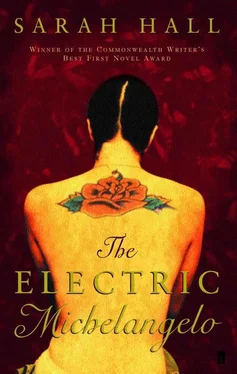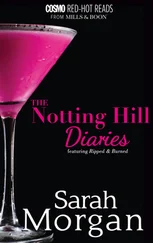Sarah Hall - The Electric Michelangelo
Здесь есть возможность читать онлайн «Sarah Hall - The Electric Michelangelo» весь текст электронной книги совершенно бесплатно (целиком полную версию без сокращений). В некоторых случаях можно слушать аудио, скачать через торрент в формате fb2 и присутствует краткое содержание. Год выпуска: 2010, Издательство: Faber and Faber, Жанр: Современная проза, на английском языке. Описание произведения, (предисловие) а так же отзывы посетителей доступны на портале библиотеки ЛибКат.
- Название:The Electric Michelangelo
- Автор:
- Издательство:Faber and Faber
- Жанр:
- Год:2010
- ISBN:нет данных
- Рейтинг книги:3 / 5. Голосов: 1
-
Избранное:Добавить в избранное
- Отзывы:
-
Ваша оценка:
- 60
- 1
- 2
- 3
- 4
- 5
The Electric Michelangelo: краткое содержание, описание и аннотация
Предлагаем к чтению аннотацию, описание, краткое содержание или предисловие (зависит от того, что написал сам автор книги «The Electric Michelangelo»). Если вы не нашли необходимую информацию о книге — напишите в комментариях, мы постараемся отыскать её.
The Electric Michelangelo — читать онлайн бесплатно полную книгу (весь текст) целиком
Ниже представлен текст книги, разбитый по страницам. Система сохранения места последней прочитанной страницы, позволяет с удобством читать онлайн бесплатно книгу «The Electric Michelangelo», без необходимости каждый раз заново искать на чём Вы остановились. Поставьте закладку, и сможете в любой момент перейти на страницу, на которой закончили чтение.
Интервал:
Закладка:
— Not exactly busy. No. But, well look, I don’t drink any more, Morris. Not for several years now. I’ll have some tea if they’ve got it.
— Right you are. Tea it is. Look in need of a good cuppa, you do. Heard you’d buggered off to Yanksville.
Cy abandoned his foraged firewood and they sat in the smoky warmth of the Horse and Farrier for an hour, talking of old times, which suited Cy as the recent chapters of his life were still too fresh with reddish paint to handle yet. Morris had been fishing since he left, he was one of the last to still work the Skears in the old way, with a pony and rake, for which he was proud if poor, and he still had his brother’s granddaddy eel in the jar, kept in the garden shed though because his wife would not allow it in the house. And none bigger had yet been found. Cy was glad of the company, the reminiscences, and glad to see his old friend. He inquired after their childhood third. Morris sighed.
— Jonty died in the war, Cyril. Early on, poor bastard, in the Battle for France, ‘forty it will have been. Bad year that, bad year. Left behind a wife and three little kiddies — well, I think you met Irene before you left, didn’t you? She took in a number of vaccies, mind you; she’s a good sort.
Cy nodded. Both of them stared into their drinks for a time. Difficult conversations and deliveries of news such as this were not unknown to either of them. They had become no easier with the passing years nor in their growing proliferation. There was still the compulsory awkward pause, the bitter sadness, the struggle to go on.
— Well, I’ll be honest, I miss the daft bugger. Were you … er …? No, never mind, I can see that you were. Still, you’re back now. How long are you staying? And where?
— Not sure. A while, I think, I’ve no plans. I’m staying at Pedder Street — above Riley’s old place.
— Bloody hell, that’s rather grim. That place has been boarded up for donkey’s years. Some little devils broke in and took it over not long after you’d gone, so the Council fastened up the windows and changed the lock. Well, listen, you’ll come round ours for your Christmas dinner. I’ll not hear otherwise. Neither will the wife, and she’s fierce when she’s on the sherry come yuletide, so you best say yes. It’s good to have you back, Parksie.

Nobody truly knew when the decline began to occur. With hindsight, it would be easier for locals to blame certain aspects — the simultaneous decline of old industries, the closing of mills and foundries in the north that furnished the seaside resort with its weekly business, package holidays available cheaply on the continent, affordable airfares, or an outside world that just suddenly sped up and left Morecambe to its old-fashioned ways. Even Cyril Parks with his testy Coney Island radar, his American-honed sense of a fading amusement industry, could not quite predict or interpret or become attuned to the evolving ebb of life out of his hometown. At first he was too occupied with work to dwell on being back and living in the haunted house of his unhappiest years. The town was busier than ever in season and he could barely cope with the summer trade. He arrived home almost penniless but with a house in his name. He fixed up the neon sign and remounted it above the doorway. He bought ink from Lancaster, and fashioned some equipment. Then the crowds began to arrive and only one or two, the hardier, older holiday-makers in Sunday suits who had been coming there for their seaside break since they were short-trousered and their fathers were besuited, only they could remember a time when Eleven Pedder Street was run by the best and most notorious tattoo artist in the northern counties. Riley had otherwise faded into folklore, his wrangling personality and his drinking taking precedent over his art in the opinion of the community, and there was no need for Cyril Parks to be forgiven for treading on his grave. The money began to roll in. After a while Cy hung paintings on the walls upstairs and bought new curtains for the windows. He let the local children string up Guy Fawkes effigies early in November from the flagpole below the bedroom window. Within a couple of years he had installed a new central heating system, because he’d be jiggered if he’d keep fetching firewood, so the waiting area was no longer quite as Baltic in temperature as it once had been. His roots began to creep back down, finding and following the path they had made when he was young. He was, after all, sand-born and sand-bred. He was, after all, Morecambrian.
When the decade rolled past the half century, they were still coming via bursting trains from Manchester and Scotland, Oldham and Leeds, and they still wanted their arms and backs decorated. He kept thinking that maybe he wouldn’t stay, maybe he’d sell up and move somewhere new, start afresh. He had only come back like a homing pigeon, because some magnetic grain in his head had drawn him there after the war ran him out of good reasons to see the world. And he’d stayed by reasoning that while there was a dependable income he may as well benefit. Rationing was over, the larder spies retreated, and rich traditional dishes once more were set on the tables of hotels and guest houses next to swan-folded napkins — again speculation abounded about who was sending potted shrimp to another King George and the Duke of Windsor and Cy was reminded of the way his mother’s consumptives relished her treats and secretly assumed that it was she. Music flooded across the Atlantic from America, and in the local dancehalls the fashions of the day took their measure from the pinball-punching, Coca-Cola swilling, rocking and rolling USA. In that decade vacation venues stuffed visitors into every nook and cranny. The recommenced illuminations drew spectators in by their thousand, celebrities came to flip the switch and electrify peacocks and garlands that ran the length of the prom, and Cy turned out to watch the festivities too and celebrated. And it felt easily remembered, and it was easy to be home.
When things fell away they fell away fast, in the blink of an eye Cy thought, and before long establishments were closing, theatres were taking final curtain calls and arcades were dismantling their tuppenny attractions before the wrecking balls began. The northern workers just stopped coming. Motorists did not pull off the A6 at Carnforth but kept on going north to the pretty towns and mountains below the rain clouds. The Prom station closed. Smug jokes were made in other British pavilions about the once comedic-authority, now pathetic and brash-becoming town of Morecambe. By then Cy wasn’t leaving. Whether it was loyalty to the townsfolk or the dwindling if faithful crowds, or old age creeping in, wanderlust waning, or whether it was just the never-and-always-changing view across the bay that he so loved, he didn’t care to contemplate. You could go to new places but the heart still pumped the same blood about the veins, and influenced the behaviour of the same brain. Over the years he felt a gradual settlement such as he hadn’t known before. He was accompanied less and less by the ghosts of Riley and Reeda, of the war and America.
When, in the last column on the last page of a national paper in 1965, he read that New York’s Steeplechase was closing down, the last of the big Coney Parks to survive the war, he felt a twinge of regret and a tug at his sentimental sleeve but he wasn’t sorry not to have been there until the end. No, Morecambe Bay it would be, come high or low economic tides. For better or worse. And where would he have gone anyway, in search of that stripy carnival nostalgia, that simplicity of entertainment? The older seasidey ways he was used to were dying out. The lettered rock and the melting cones no longer brought sticky, sugary pleasure, the waves were too cold and bound with seaweed, the repetitive jokes and merry songs of the collective nation failed to rouse and remedy the modern weary spirit of the population. People did not want to make do with a shared washroom and tinned fruit when they could have private facilities abroad, the Mediterranean was warm and appealingly blue, the food was exotic and the children could split off from the parents so that each could have made-to-measure fun in the sun. Even the blind fiddler at the old harbour, who was now a hundred if a day, could have seen that the changes were unstoppable and the damage irreparable. And regardless of all that, besides the folding tatty umbrella of an industry that had always sheltered his trade, wherever he was in the world, fairground fed or not, those who came to him would remain the same. Tattooing was unto itself its very own art form, old as the hills and stranger than time. Whether in rich, far-flung resorts or condemned cottages, glamorous prestige or ragged poverty, human hearts and souls were variable and would always require painting.
Читать дальшеИнтервал:
Закладка:
Похожие книги на «The Electric Michelangelo»
Представляем Вашему вниманию похожие книги на «The Electric Michelangelo» списком для выбора. Мы отобрали схожую по названию и смыслу литературу в надежде предоставить читателям больше вариантов отыскать новые, интересные, ещё непрочитанные произведения.
Обсуждение, отзывы о книге «The Electric Michelangelo» и просто собственные мнения читателей. Оставьте ваши комментарии, напишите, что Вы думаете о произведении, его смысле или главных героях. Укажите что конкретно понравилось, а что нет, и почему Вы так считаете.












